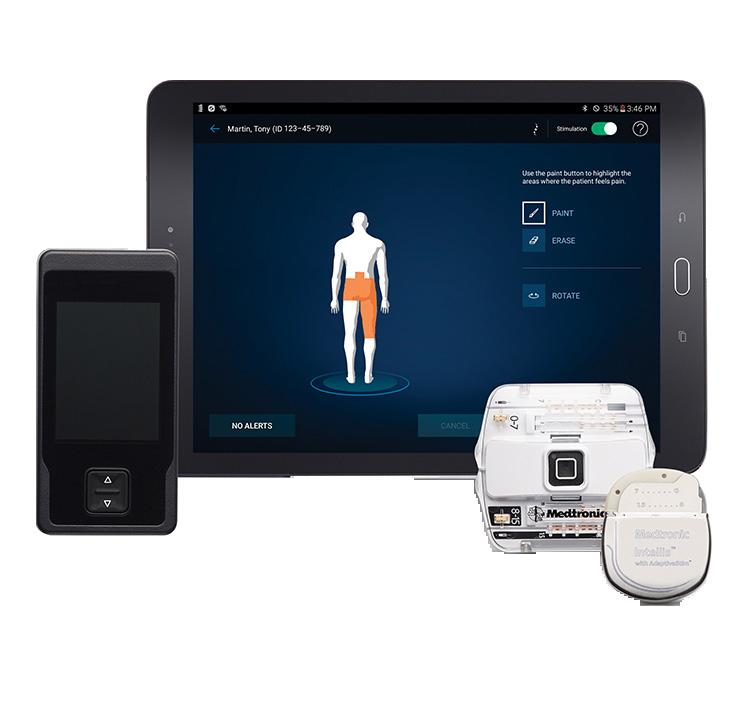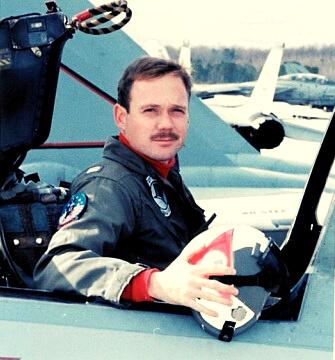
4 minute read
High Tech Pain Relief
By Jacqueline Makowski
It was exhilarating and heroic work. No other group of people can say they have taken off from and landed on a naval aircraft carrier.
United States Naval Flight Officer Tony DeRossett is one of the elite few. Tony served his country traveling at speeds greater than 1,300 miles per hour in the cockpit of the world’s fastest fighter jets.
Tony logged more than 3,000 hours of rigorous flights, which over time took a substantial toll on his spine. The continual jarring force of flight maneuvers ultimately compromised the discs and vertebrae in his spine resulting in severe back and neck pain.
"Many people don't realize the strain it takes on your spine when you're up there, twisting and turning doing your job," Tony said, "the lion share of my back and neck injury came from pulling G's."
Tony would routinely catapult from 0 to 150 miles per hour off aircraft carriers at times pulling upwards of 7-Gs or 7 times the force of gravity humans are normally exposed to when on Earth. For perspective, astronauts experience a maximum G-force of approximately 3G’s during a rocket launch. While active duty, Tony received a lumbar spinal fusion for his back pain, as well as a cervical fusion for nerve damage in his neck and arms. The surgeries allowed him to continue flying for a few years but the pain never completely dissipated.
Tony retired from service but continued to work as a defense contractor. Unfortunately, Tony’s pain persisted leading to an early retirement.
Tony consulted with Dr. Ronald Collins at Tennessee Valley Pain Consultants and Huntsville Hospital who developed an individualized plan of care. Dr. Collins is an anesthesiology and pain management physician specializing in the minimally-invasive treatment of common spinal, nerve and joint conditions.
Dr. Collins diagnosed Tony with Degenerative Joint Disease and offered non-surgical modalities including spinal injections and nerve ablation. The treatments provided relief initially but his pain continued to return.
Dr. Collins recommended trialing an innovative therapy called neuromodulation, which controls pain through a small implanted device called a neuro-stimulator. The stimulator acts like a pacemaker for the spine disrupting pain signals traveling between the spinal cord and the brain.
“Impulses travel from the device to the spine over thin insulated wires called leads,” Collins said. “The leads deliver mild electrical impulses to an area near the spine interrupting pain signals.”
Neuromodulation offers individualized pain relief where patients control the settings to meet their unique needs.
“For the appropriate patient, a stimulator can provide long-term therapy for chronic pain conditions and can help reduce the need for oral pain medication,” said Dr. Collins.

Tony DeRossett, US Navy fighter jet pilot
Dr. Collins coordinated with Dr. Thomas Kraus anesthesiology and pain management physician also at Tennessee Valley Pain Consultants, to trial Medtronic’s new Intellis stimulator.
“Unlike most medical procedures, patients are able to try this technology first,” Dr. Thomas Kraus said. “The trial helps patients experience how well the neuro-stimulator relieves their pain during different daily activities.”
The trial allows patients to receive stimulation therapy for up to 10 days by using an external stimulator mimicking the actual treatment. “It’s important to know the trial is available,” Tony said. “The first good night’s sleep I got, I was sold.”
A few weeks later, Dr. Kraus implanted the permanent device. Implantation is similar to the trial with leads placed near the spinal cord and is an outpatient procedure.
“With the stimulator, I’ve had a tremendous improvement in pain and my quality of life,” Tony said. “I have more confidence because [my back] doesn’t hurt.”
Tony’s stimulator works off Bluetooth technology and is paired with a small wireless handheld device. This allows patients like Tony to increase or decrease stimulation for personalized pain relief.
The Intellis system also has an adaptive technology which automatically adjusts as patients change positions such as from sitting to standing.
Tony has also been able to reduce the amount of medication needed since the neuro-stimulator was implanted. He offered to share his story to help others.
“I’ve improved markedly since starting care at Huntsville Hospital and Tennessee Valley Pain Consultants,” Tony said. “I was miserable for a long time, and I didn’t need to be.”
Dr. John Roberts, anesthesiology and pain management physician, also with Tennessee Valley Pain Consultants implanted the first Intellis stimulator in the state at Huntsville Hospital in October 2017.
Tennessee Valley Pain Consultants offers immediate appointments for patients with acute and chronic pain. Call (256) 265-7246 to schedule an appointment with an expert in anesthesiology and pain management. For more than 20 years, Tennessee valley Pain Consultants and Huntsville Hospital have been the regional leader in nonsurgical pain relief services. The practice has the area’s only team of double-board certified physicians in anesthesiology and pain management with more than a century of combined experience. tnvalleypain.com (256) 265-7246









